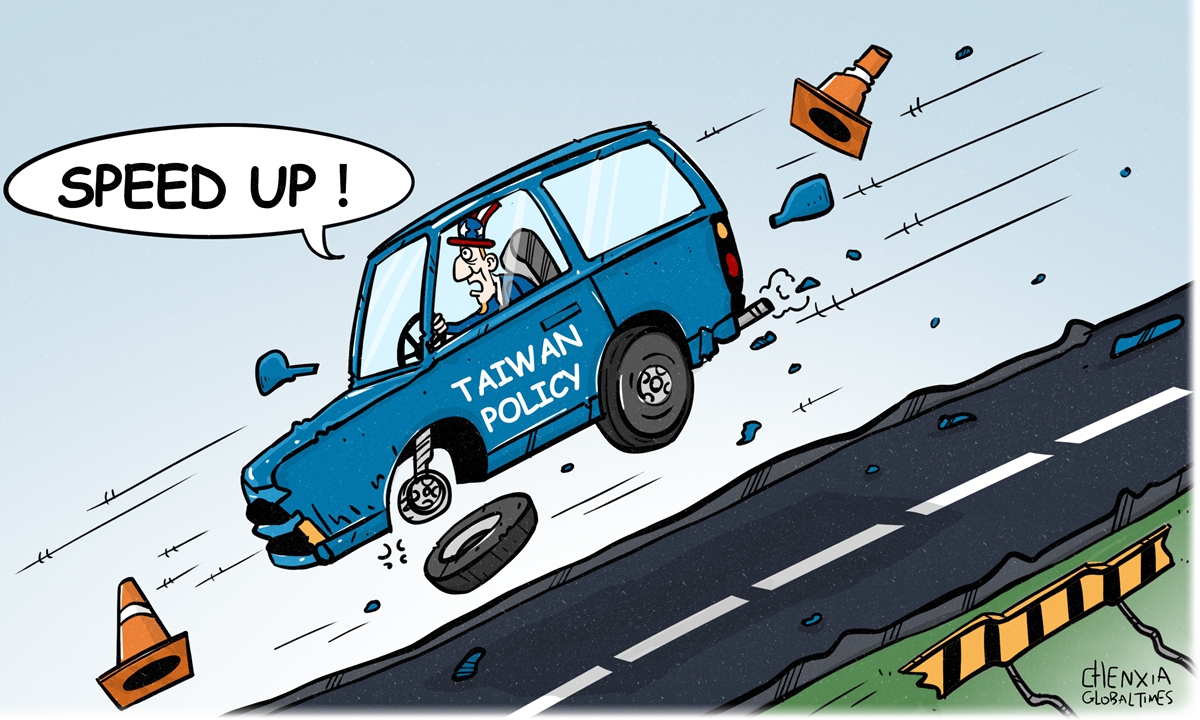
US Taiwan policy Illustration: Chen Xia/GT
The ruling Democratic Progressive Party (DPP) of the Taiwan island has intensified its collusion with anti-China forces in the US in face of the upcoming election season. The latest fallout includes a bill that aims to expand secessionist authorities' international space passed by the US House Foreign Affairs Committee, as well "significant additional security assistance" to the island from the Biden administration.
Expert described the US' seeking detente with China while continuing its provocations by playing the "Taiwan card" as "a split political personality." As the Taiwan region enters the election season after the opposition Chinese Kuomintang (KMT) announced its candidate for the 2024 regional leader elections on Wednesday, any US action related to Taiwan implies that the US may intend to affect the political environment of the island in accord with US preferences. And that would make the cross-Straits situation more grim and intense.
Chaired by Congressman Michael McCaul, an anti-China hawk who visited Taiwan in April, the US House Foreign Affairs Committee on Tuesday (local time) passed a bill dubbed the "Taiwan International Solidarity Act," which aims to "protect Taiwan's participation in international organizations."
US Defense Secretary Lloyd Austin also disclosed on Tuesday that Washington will soon provide significant additional security assistance through the presidential drawdown authority that Congress authorized last year, according to Reuters. Citing sources, Reuters said on May 8 that the Biden administration plans to send $500 million worth of weapons aid to Taiwan island.
The provocative moves from the US come as Taiwan's opposition KMT party announced its candidate for the 2024 Taiwan regional leader race. Hou Yu-ih, the mayor of New Taipei city since 2018, was officially named on Wednesday afternoon.
Hou has recently given a rare insight into his cross-Straits stance, saying that he resolutely opposes Taiwan independence. But Hou also said neither does he agree with the "One Country, Two Systems."
Ma Xiaoguang, a Taiwan Affairs Office spokesperson, said at a press briefing on Wednesday that "Taiwan independence" undermines the common interests of compatriots on both sides of the Straits and the fundamental interests of the Chinese nation. "It is a dead-end road that leads nowhere," Ma said.
It is designed to safeguard the benefits and interests of compatriots on the island while taking the reality of the situation in Taiwan into consideration so that we stick to the policy of "peaceful reunification and One Country, Two systems," Ma said, commenting on inquiries concerning Hou's stance.
Different systems are not an obstacle to reunification, still less an excuse for "Taiwan independence," Ma said, noting that the mainland is ready to work with Taiwan compatriots to promote peaceful development of cross-Straits relations and safeguard peace and stability across the Taiwan Straits, on the common political basis of adhering to the 1992 Consensus and opposing Taiwan secession.
Lai Ching-de, the DPP's candidate for Taiwan's regional leader election in 2024 has recently claimed that the biggest challenge the island facing with is "threat of force" from the mainland, and that accepting the 1992 Consensus and the One-China principle is tantamount to giving up the "sovereignty of Taiwan", which will not bring sustainable peace.
Responding to that, Ma on Wednesday commented that Lai's words disregarded facts and are illogical, once again exposing the absurdity of the "Taiwan independence" argument.
Taiwan is a part of China and has never been a country, nor has so-called "sovereignty", Ma said, noting that the 1992 Consensus, which embodies the One-China principle, is the political foundation for the peaceful development of cross-Strait relations, he added, and denying this basis and attempting to change the status quo that both the mainland and Taiwan belong to the same China will only undermine peace across the Taiwan Strait and plunge cross-Strait relations into turmoil.
US politics has fallen into a split personality as on the one hand they want to ease tensions with China, and on the other they are getting increasingly adventurous on the Taiwan question, Wang Jianmin, a senior cross-Straits expert at Minnan Normal University in East China's Fujian Province, told the Global Times on Wednesday.
Li Haidong, a professor at the Institute of International Relations at the China Foreign Affairs University, told the Global Times on Wednesday that US' actions show they will use all means to keep Taiwan island away from China. By creating crisis and tension across the Taiwan Straits, the US attempts to complicate the environment to contain China's development.
As the island enters the election season, any Taiwan-related move by the US may show they harbor ulterior motives to manipulate the island's political environment in the direction the US wants to see it develop, Li said.
A poll released by the "Taiwanese public opinion foundation" on Monday found that more than half of Taiwan voters do not support the DPP staying in power after the 2024 regional election.
If the DPP stays in power and continues to collude with the US to confront the mainland, the situation across the Taiwan Straits will deteriorate further and prospects for peaceful development will be dim, Wang said.
The DPP is trying to boost its election chances by creating more divisions as a pawn of the US, while the KMT puts more emphasis on the balance of the relationship between the Chinese mainland and the US, Wang said.




